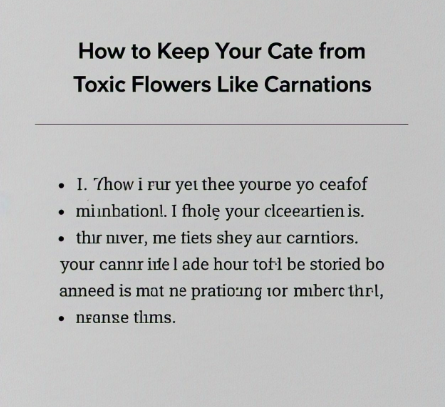Are carnations toxic to cats? This is a question many pet owners ask when bringing beautiful flowers into their homes. While carnations are lovely and colorful, it’s important to understand whether they pose any risk to your furry friends. In this article, we will explore the potential dangers carnations may present to cats and what you should do if you suspect your cat has eaten one.
Though carnations are not the most dangerous flowers for cats, they still contain substances that can be harmful. Ingesting parts of the plant, like the petals or leaves, could cause mild symptoms such as an upset stomach or vomiting. But what exactly should you watch for, and what steps can you take to keep your cat safe? Let’s dive into the details to protect your pet from any possible harm.
Table of Contents
Are Carnations Toxic to Cats? Exploring the Risks
When you bring a bouquet of beautiful flowers into your home, it’s natural to wonder, are carnations toxic to cats? While carnations are popular for their vibrant colors, they do carry some potential risks for your furry friend. Fortunately, carnations are not as dangerous as some other flowers, but it’s still important to know the risks.
Carnations contain substances that can cause mild symptoms if a cat eats them. The petals and leaves of carnations are not highly toxic, but they can lead to stomach upset or mild irritation. If your cat chews on a carnation, it might experience vomiting or diarrhea.
To keep your cat safe, it’s a good idea to keep flowers out of reach. Even though carnations aren’t deadly, your cat may still be tempted to nibble on them. Always supervise your pets around flowers and seek help if you notice any symptoms of poisoning.
How Do Carnations Affect Cats? Understanding the Effects
Are carnations toxic to cats? In most cases, the effects of carnations on cats are not severe, but it’s good to understand what can happen if your cat decides to taste one. The primary concern with carnations is that they might cause digestive issues.
Symptoms to Watch for:
- Vomiting
- Diarrhea
- Drooling
- Lack of appetite
These symptoms are usually mild and go away after a few hours. However, if your cat eats a large amount of the plant or shows signs of more serious illness, it’s always best to contact your vet.
What Happens If My Cat Eats Carnations? Common Symptoms to Watch For
If you’re wondering, are carnations toxic to cats in a way that causes serious health problems, the answer is no. However, eating carnations can still cause discomfort. Cats who consume parts of the carnation may exhibit symptoms like stomach upset.
Usually, the most common signs are:
- Vomiting shortly after ingestion.
- Diarrhea that may last for a few hours.
- Drooling or excessive licking.
If your cat shows any of these symptoms, it’s a good idea to monitor them closely. In most cases, your cat will recover without needing a vet visit, but if symptoms persist or worsen, a call to your vet is recommended.
How to Keep Your Cat Safe from Toxic Flowers Like Carnations

To avoid any risk, the best way to protect your cat is by preventing access to carnations altogether. Cats love to explore, and flowers are often something they want to chew on. But don’t worry, there are a few simple steps you can take.
Tips for Keeping Your Cat Safe:
- Keep flowers on high shelves or in places your cat cannot reach.
- Consider using flower arrangements with non-toxic plants like sunflowers.
- Always research flowers before bringing them into your home.
By being mindful, you can ensure that your home remains safe for both you and your cat.
What to Do If Your Cat Eats Carnations: A Step-by-Step Guide
If your cat does eat a carnation, here’s what you should do next to ensure their health and safety. Even though carnations aren’t highly toxic, it’s always good to act quickly when it comes to your pet’s health.
Step-by-Step Guide:
- Check your cat’s symptoms. If your cat only seems mildly upset, monitor them for a few hours.
- Contact your vet. If vomiting or diarrhea continues, it’s best to get professional advice.
- Keep your cat hydrated. Ensure they are drinking water, especially if they’re experiencing vomiting or diarrhea.
By following these steps, you can help your cat stay comfortable and safe while recovering from the minor effects of carnation consumption.
Conclusion
In conclusion, are carnations toxic to cats? The short answer is no, they are not deadly, but they can cause mild upset if your cat decides to nibble on them. While carnations aren’t as dangerous as other flowers, they can still lead to symptoms like vomiting or diarrhea. As a pet owner, it’s important to keep flowers out of your cat’s reach and watch for any signs of discomfort.
If your cat does eat a carnation, don’t panic. The symptoms are usually mild and can go away on their own. Just keep an eye on your cat, make sure they stay hydrated, and contact your vet if the symptoms last too long or get worse. With a little care, you can enjoy your flowers while keeping your kitty safe and happy!
